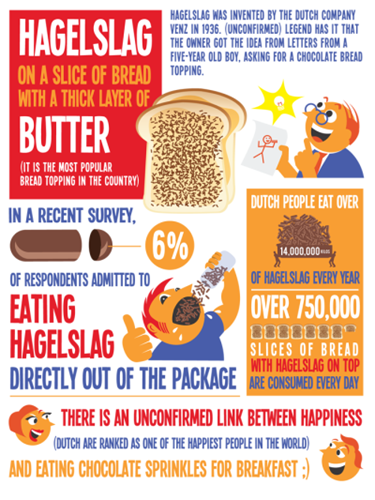I stumbled upon this pretty nice African proverb and I wonder what it's in other languages. I think it's originally a Nigerian proverb.
The English translation is:
"Not to know is bad. Not to wish to know is worse. "
in Spanish it is the same:
No saber es malo. No querer saber es peor.
Hello from Barcelona! Some usefull stuff to speak catalan:
It’s hard to complete a Catalan sentence without «merda» (shit). Shit is always on the tip of the Catalan tongue, whether used to describe speed, cowardice, disappointment, avarice, explosive mushrooms, etc., etc., literally ad nauseum.
Check out these expressions but don't freak out!
* «Molta merda!» (a lot of shit!) - Good luck!
*«a cagar a la via» (go shit on the train tracks) - A way of expressing anger, and the hope that your interlocutor will be hit by a train during his caganer moment.
* «Cagacalces» (underpants-shitter) — a coward
* «cagar el basto» (to shit the baton) - to do something badly
* «em cago en la mar salada» (I shit myself in the salty sea) - a way of swearing at one's misfortune
* «porta una merda com un piano» (he's carrying a shit like a piano) - he's very drunk

Dutch farm can surprise you!
The cows don't say «moo» here, but «Boo»!
«Boe» in Dutch.
And it's not the end!
Pigs: “knor-knor”!
Dogs: «hab hab hab»

Feliç diada de Sant Jordi!
Feliz día de San Jorge!

Hagelslag? Any English (or whatever) analogue?
I don't know why, but in Spanish language there are many expression with green color and almost always it has quite a negative meaning. Strange, isn't it. Green is the color of that nature, peace and all that stuff... Well, just have a look of some of these expression:
Chiste verde (green joke) = joke about sex
Poner verde = talk behind back
Estar verde = to be not adult, without life o professional experience
Un viejo verde = An old man who puts the make on young girls
What do you think?
And one more expression for Spanish fans!
A mi, me encanta de verdad!
QUE SI QUIERES ARROZ CATALINA
Cuando alguien dice lo de “que si quieres arroz Catalina” es cuando no le hacen caso de ninguna de las maneras a algo que ha dicho o hecho.
Divertido, ¿verdad? Pues este extraño dicho parece tener su origen en una señora llamada Catalina que vivía en los tiempos de Juan II de Castilla (o lo que es lo mismo, por el Siglo XV) y que por lo visto, además de consumir grandes cantidades de arroz, lo recomendaba a todo el mundo como remedio a cualquier mal. En su lecho de muerte, los vecinos se reunieron en torno a ella y recitaron a coro: “¿quieres arroz Catalina?” y otra vez “¿quieres arroz Catalina?” y al ver que ésta no respondía (la pobre estaba tan débil que no era capaz de articular palabra) le dijeron todos a coro: “¡que si quieres arroz, Catalina!”. Y ella, moribunda, tampoco fue capaz de contestar. Desde entonces, esta frase se dice cuando alguien no hace caso a lo que dicen.
Hola.
Just one more Spanish expression that I like a lot. Hope you enjoy as well.
Como Pedro por su casa.
Se dice que alguien está “como Pedro por su casa” cuando llega a un sitio nuevo o desconocido y sin embargo enseguida se mueve por él como si lo conociera perfectamente. También se usa cuando alguien tiene mucha confianza y se comporta con toda naturalidad, saltándose a veces la prudencia que se supone que hay que tener ante lo desconocido.
Pero vayamos a lo nuestro, es decir, a los ejemplos: “Juan ha empezado hace 2 días en la nueva oficina y ya está como Pedro por su casa” (es decir, que parece que lleva allí toda la vida, que ya se conoce cómo va todo y se siente cómodo allí).
Some words about Spanish expression TENER ENCHUFE.
Aunque esta expresión sea muy española (por suerte para algunos y para desgracia de otros lo de tener enchufe funciona mucho en España), para conocer su origen tenemos que referirnos al mundo anglosajón.
Tener enchufe proviene de “to have connections”, lo cual significa en inglés algo así como tener un medio de unión, un link (para la gente que esté acostumbrada al vocabulario online seguro que es fácil de imaginar lo que eso significa). Es decir, si conoces a alguien que te sirva de enlace para llegar a otra persona, el camino es mucho más fácil que si no es así.
Some english-spanish misleading word!
Falsos amigos!
Cuidado!=)
“Estar embarazado” is Spanish is not the same than “be embarrassed” in English!
My favorite mistake actually=)
Attention! “Estoy embarazado/a” meens “to be pregnant” and not “to feel shy” in Spanish language! I've just heard a lot this expression from no native Spanish speakers and the most funny when you hear it from the male!=)